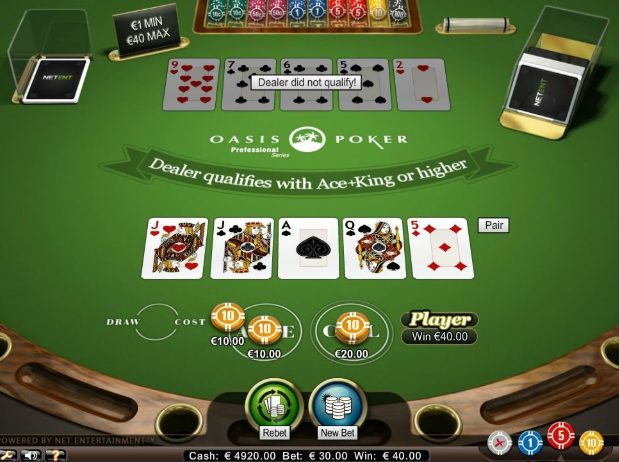In Oasis poker, you are given five cards to make a poker hand. The dealer gets the same. The thing that makes the game unique is that you can only see one card from the dealer’s hand. If you raise your initial bet, then the dealer will reveal his card.
During the round, you can switch your card. This is great if you have a bad hand, but it comes at a cost. You have to pay the price of the ante to do this. Given these rules that give the house an edge, let us see some best practices about switching that can help you win more money.
The only two reasons to switch are:
- Your hand has four cards that make a flush or straight. Do this even if you have a pair.
- Your hand has four cards missing one card to make a straight. Switch with or without a pair.
It is tempting to switch hands and test your luck, but this can prove to be a mistake, and we shall explain why.
Why Is It Effective?
This strategy is effective because what you are trying to do is to make the most out of your hand. It is not like free slots no download games where there is no such thing as a great hand. In Oasis poker, you do not just fight the dealer’s card straight out. The dealer must have at least a king or an ace to qualify. If the dealer does not have at least an ace high or a king high, then the round is nullified, and all the bets and switch costs are given back to you.
If you switch based on the strategy above, and the dealer qualifies, you have better chances of beating his hand. Why? Because you are only missing one card to make a straight or a flush. This, of course, is not a guaranteed win. But if you are lucky, then you can complete a straight or a flush hand, making your hand powerful enough to beat the dealer’s. If he/she does not qualify, you get back your ante bet, and the raise is pushed.
As you can see, the price of the switch is justified because you are betting on the odds that the dealer will qualify and that you have a better hand than he does.
When Should You Not Switch?
If you have a high two-of-a-kind or pair, do not switch. The same principle applies if you have three-of-a-kind. These hands are optimal and can give you great winning odds with no need to spend on switching.
Also, try not to switch more than two cards. If you do, you are spending an ante bet on each card you switch. If you win, the dealer only pays the cost of the ante and the raise, but not the switch cost.
Summary
Do not get tempted to switch hands. Each switch has a cost that does not get paid if you wins a round. Do not switch cards to get the best hand, but switch only to get an optimal hand.



